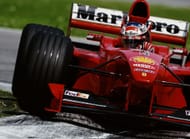Former F1 driver, Michael Schumacher, discussed how he is perceived as a driver who is given more advantage over his teammates in an interview he gave at the final round of the 1999 season at the Japanese Grand Prix. The 91-time race winner, speaking with fellow driver Damon Hill, was asked if it would feel good to be teammates with someone who is on equal footing.
Schumacher rejected the idea that any of his teammates weren't already his equals - who were given the same opportunities as him to be as good or better. While the German believed that out of the two drivers, the faster one should receive better treatment from the team, he acknowledged in his case that he had made that happen for him.
In response to Hill's question, Schumacher also mentioned how he helped his Ferrari teammate, Eddie Irvine, during the 1999 Malaysian Grand Prix which ended with Irvine and Schumacher securing a 1-2 finish. Schumacher also goes on to say that he has never stopped his team from helping his teammate become better (via The Ferrari Owner's Club):
"They have all had the same opportunity as I have. But because I'm faster 95 per cent of the time, it looks like my teammates are not treated equally. But it's not true."
Michael Schumacher would go on to finish the 1999 season in fifth place in the standings, three positions behind his teammate Irvine, despite not competing in six races that year due to a broken leg he suffered at the British Grand Prix.
Schumacher's P5 finish in the drivers' championship was his lowest after his championship wins in 1994 and 1995. Following this, he would go on to consecutively win the next five seasons, securing a total of seven championships.
Michael Schumacher on what made him a better driver than his teammates

In conversation with Damon Hill at the Suzuka Circuit towards the tail end of the 1999 season, Michael Schumacher was asked about his driving style, specifically why he believes that makes him faster than his teammates despite having the same car.
Schumacher denied it being a "style" that makes him more successful, saying (via The Ferrari Owner's Club):
"I think it's more a method than a style. I believe that my personal speed - compared with the drivers I've driven with, because it's only those guys I can compare myself with - may come from what you do out of your possibilities. I believe the pure speed isn't always the point; it's what you manage to get out of your potential. And that's where I've always been very successful. You know, really working deep with the team, maximising my possibilities."
During his time in Formula 1, Schumacher secured the record for most consecutive seasons with an F1 win. From 1992 to 2006, the German driver has scored at least one victory per season.
